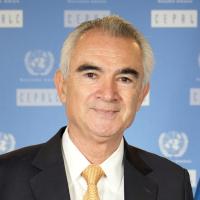No More Lost Decades: Opportunities From Nearshoring, the Energy Transition, and Other Drivers of Sustainable Growth
Latin America and the Caribbean is emerging from another period of slow growth, punctuated by the devastating economic consequences of the pandemic. The region's economies grew on average by 0.9% per year over the past 10 years, worse than during the notorious “lost decade” of the 1980s. Slow growth has left few resources to meet public expectations for job creation and public services, including health and education, or to invest in infrastructure to improve competitiveness. Progress fighting poverty and inequality has slowed. Political uncertainty and climate change cloud the horizon.
Paradoxically, the region also enjoys remarkable opportunities. Its abundant mineral resources are in high demand for clean energy technologies such as batteries and electric vehicles. Meanwhile, major multinational companies are increasingly turning to the region to diversify supply chains that are overly concentrated in Asia. The US government supports that trend, seeing hemispheric integration as the key to US competitiveness and for assuring reliable supplies of strategic products ranging from medical devices to microprocessors.
To seize these opportunities, governments in Latin America and the Caribbean need new development strategies, according to the Chile-based UN Economic Commission for Latin America and the Caribbean (ECLAC). ECLAC has played a historic role in regional debates about development and economic integration, and its insights are particularly vital today.
Please join the Wilson Center’s Latin America Program on Thursday, May 9, 2024, from 12:30 p.m. to 1:30 p.m. (ET) for a virtual discussion with the new ECLAC executive secretary, Dr. José Manuel Salazar-Xirinachs. In his first official visit to Washington he will share his vision for transforming the region’s approach to inclusive, sustainable development.
Speaker

Moderator

Hosted By

Latin America Program
The Wilson Center’s prestigious Latin America Program provides non-partisan expertise to a broad community of decision makers in the United States and Latin America on critical policy issues facing the Hemisphere. The Program provides insightful and actionable research for policymakers, private sector leaders, journalists, and public intellectuals in the United States and Latin America. To bridge the gap between scholarship and policy action, it fosters new inquiry, sponsors high-level public and private meetings among multiple stakeholders, and explores policy options to improve outcomes for citizens throughout the Americas. Drawing on the Wilson Center’s strength as the nation’s key non-partisan policy forum, the Program serves as a trusted source of analysis and a vital point of contact between the worlds of scholarship and action. Read more


Argentina Project
The Argentina Project is the premier institution for policy-relevant research on politics and economics in Argentina. Read more


Brazil Institute
The Brazil Institute—the only country-specific policy institution focused on Brazil in Washington—aims to deepen understanding of Brazil’s complex landscape and strengthen relations between Brazilian and US institutions across all sectors. Read more


Wahba Institute for Strategic Competition
The Wahba Institute for Strategic Competition works to shape conversations and inspire meaningful action to strengthen technology, trade, infrastructure, and energy as part of American economic and global leadership that benefits the nation and the world. Read more


